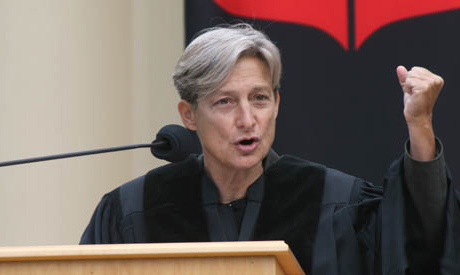Judith Butler, the Iconoclast: Elisabeth Roudinesco on Judith Butler


Philosopher and professor in rhetoric at the University of California (Berkeley), Judith Butler, born in 1956, made her name in the English-speaking academic world a quarter of a century ago with the publication of her Gender Trouble. Feminism and the Subversion of Identity. This complex work, which has now become a classic, has nothing in common with the ‘gender theory’ recently invented by the opponents of gay marriage.
Far from having invented gender studies, which have been taught in American universities since the early 1960s and which sought to distinguish anatomical sex from socially or psychically constructed gender identities, Judith Butler was rather more of an iconoclastic heir to them. Basing herself on the French thought of the 1970s – from Simone de Beauvoir to Jacques Lacan – in her 1990 work she gave due focus to life on the ‘border lines’, arguing that sexual difference is always fluid and that transsexuality (the conviction that one belongs to another sex), for example, could be a way of subverting the established order and refusing the biological norm. Butler had herself very early in life found herself in a situation outside the norm, lacking in borders, on account of her identity as a Jewish woman raised as a Jew but critical of the policies of the State of Israel.
In order to think through this question she developed what would become called ‘queer theory’. This had some success and helped address marginal and ‘troubled’ sexual behaviours such as transgender, transvestism and transsexuality. This position earned her the hatred of a good number of French feminists, who treated her as a ‘differentialist’ (that is, venerating difference) and reproached her for her critical attitude toward republican secularism [laïcité] and the ban on religious symbols in schools. In reality, she was defending a universality of differences, far more than she was upholding an anti-universalist cult of difference.
It was in this perspective of studying radical differences that she became interested in the question of the ‘precarious’ or ‘unliveable’ life, the ‘survival’ of minorities of all kinds: Palestinians, the stateless, immigrants, the exploited, and deviants. Hence the title of this talk: ‘What is a good life?’ given in Frankfurt on 11 September 2012 upon her being awarded the prestigious Adorno Prize, in the wake of the likes of Pierre Boulez, Jürgen Habermas and Jean-Luc Godard.
Ethical resistance
In this brief text, of striking clarity, she commented on Theodor Adorno’s famous proposition according to which it is not possible to ‘lead a good life in a bad one’. Examining the manner in which this question had been addressed by both ancient and modern thinkers – the former speaking of the harmony between the good life and the world’s cosmic order, and the latter of a subjective wisdom – she concluded that to lead a ‘good life’ within an inegalitarian world (‘bad life’) meant an attitude of ethical resistance situated between acceptance and refusal, between the maintenance of the self and opening out to others: If I am to lead a good life, it will be a life lived with others, a life that is no life without those others’.
From the moment that her visit to Frankfurt had been announced, Judith Butler was the target of a cabal on the part of the Berlin Jewish community and Israeli ambassador. Treated as being ‘depraved’ on account of her ‘queer theory’, and as an ‘anti-Semitic enemy of Israel’ on account of her defence of the Palestinian people, she was moreover accused of having claimed that Hamas and Hezbollah belonged to the ‘international Left’ and having participated in BDS (Boycott, Divestment, Sanctions) actions targeting Israeli institutions (Frankfurter Allgemeine Zeitung, 28 August 2012). In reality, her detractors were using a quotation taken out of context, in which she was responding to an interviewer who quizzed her on the anti-imperialist character of these two organisations. As for BDS, she had never advocated this except in regard to actions targeting the settler colonisation of the Occupied Territories. She was then pulled into the mire on account of her excellent work Parting Ways: Jewishness and the Critique of Zionism, in which she discussed at length a pronouncement by the philosopher Emmanuel Levinas.
Rather than insulting the brilliant philosopher Judith Butler, whose innovative theses describe the new poverty of the contemporary world and intend to repair it rather than wage a perpetual war against other people, it is better to read what she has written. In this regard, this conference on the ‘good life’ will allow the reader to understand what Judith Butler really is: a ‘fierce and calm Antigone’, according to her translator Martin Rueff.
Elisabeth Roudinesco
Translated by David Broder. Original French version can be read here.
